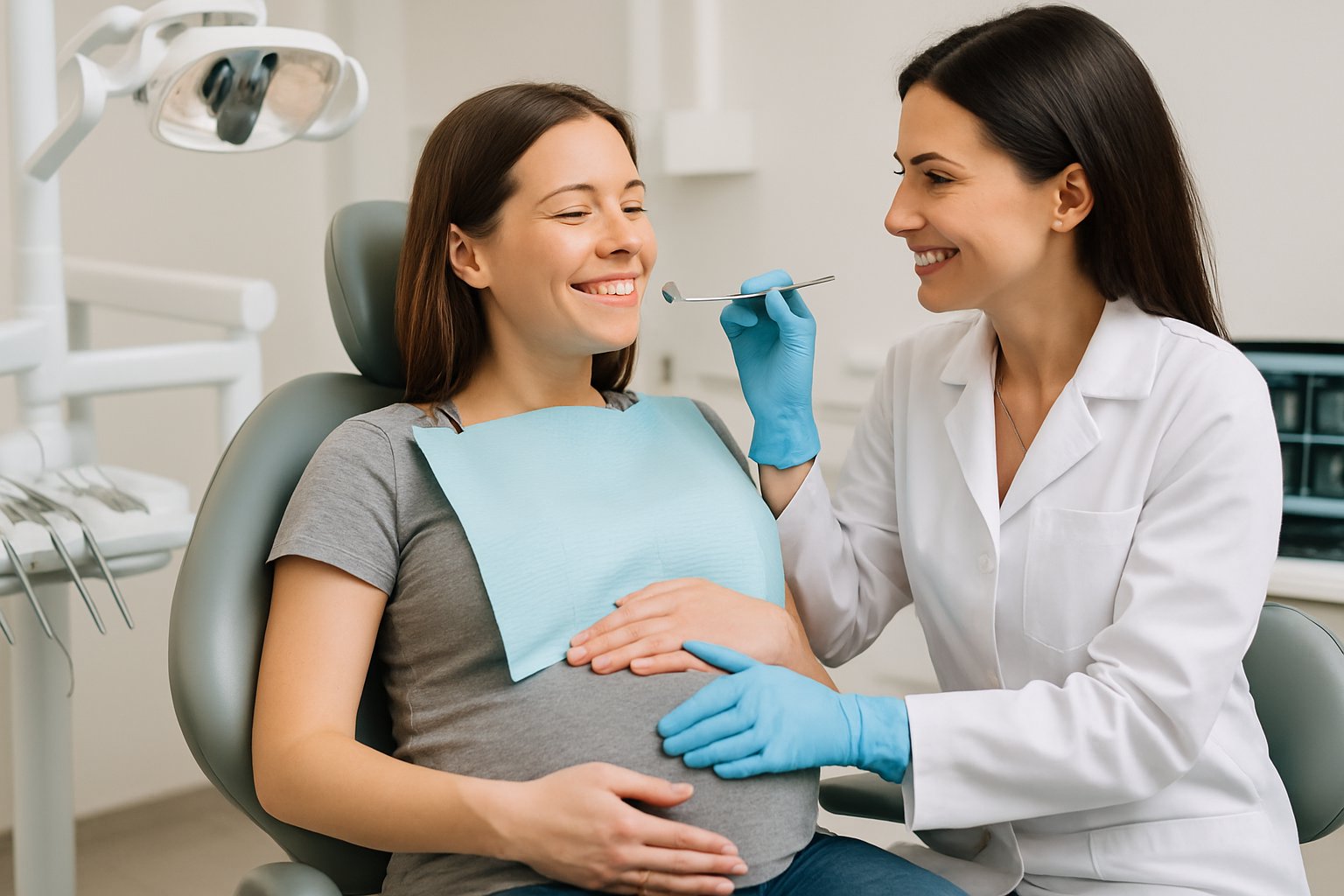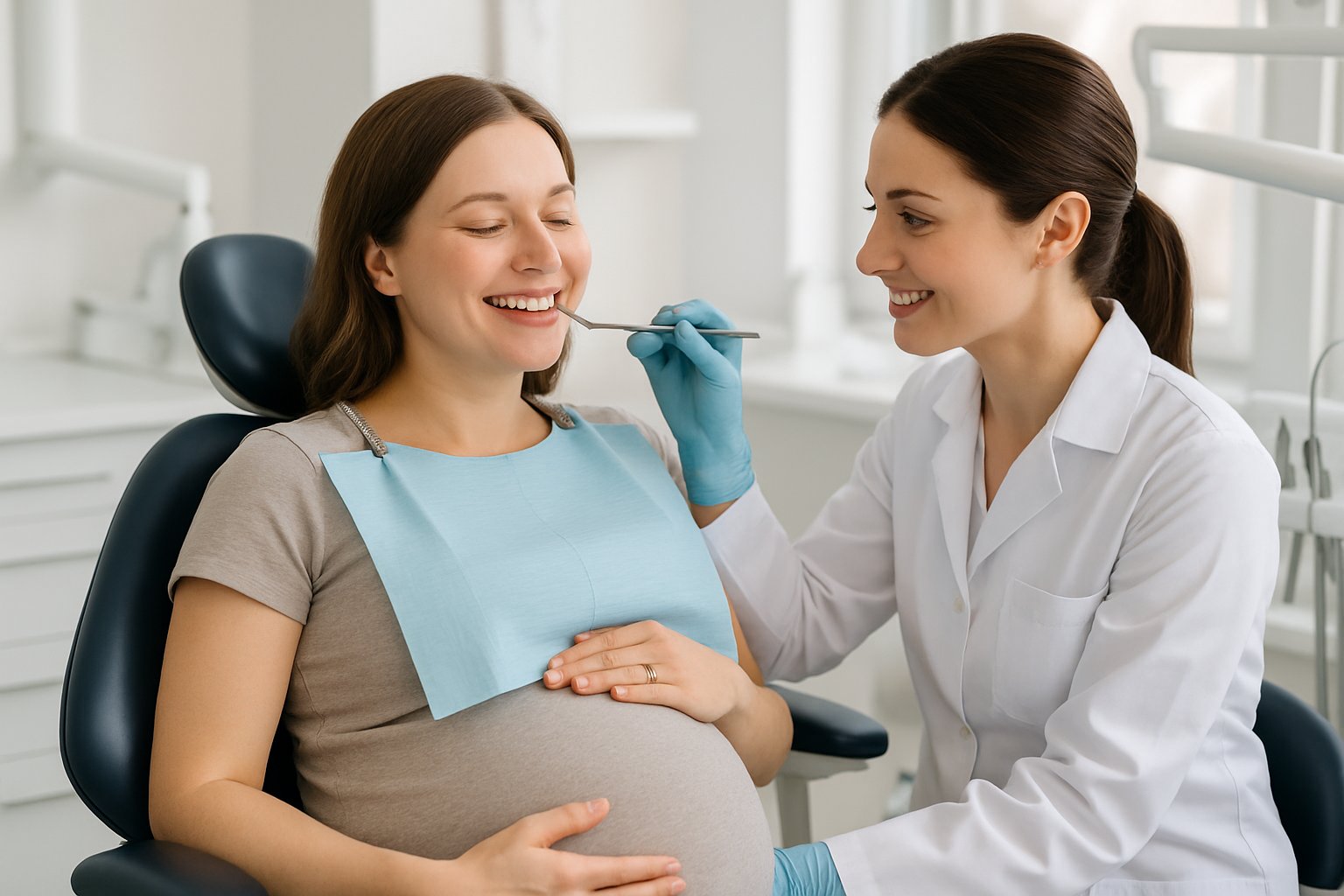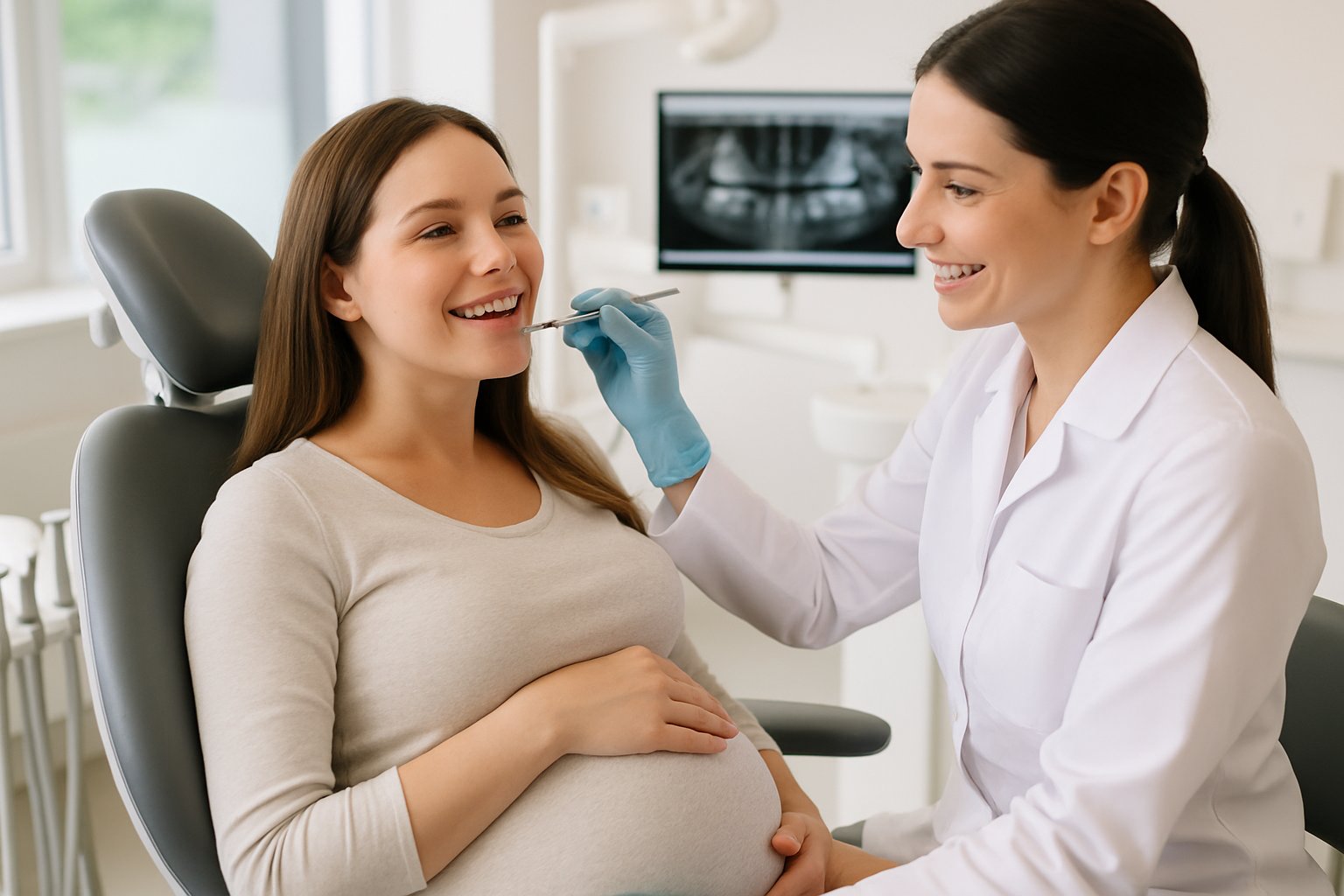Dental Care In Pregnancy

Taking care of your teeth and gums becomes even more important when you’re pregnant. Your body goes through many changes that can affect your mouth, and these changes can impact both you and your baby’s health.
Pregnancy hormones raise your risk of gum disease. Gum disease can lead to premature birth and low birth weight babies.
Many women skip dental visits during pregnancy because they worry it might harm their baby. This fear often makes oral health problems worse.
Dental care during pregnancy is safe and necessary. Regular cleanings and checkups help protect both you and your growing baby.
You can keep your mouth healthy during this important time by following simple steps.
Key Takeaways
- Pregnancy hormones make gum disease more likely and can affect your baby’s health.
- Dental cleanings and treatments are safe during pregnancy and should not be skipped.
- Good oral care habits during pregnancy protect both mother and baby from serious health problems.
Essential Oral Health Changes During Pregnancy

Pregnancy causes significant changes to your mouth and gums because of hormones. Your gums become more sensitive and prone to bleeding and swelling.
Oral infections during pregnancy can affect both you and your baby’s health.
Hormonal Effects on Gums and Teeth
Pregnancy hormones, especially estrogen and progesterone, increase blood flow to your gums. This makes them more sensitive to plaque and bacteria.
Your gums may swell, bleed, and feel tender even with gentle brushing. These hormonal changes start as early as the second month of pregnancy and peak during the second trimester.
The increased hormone levels make your gums react more strongly to irritants.
Common signs include:
- Red, swollen gums
- Bleeding when brushing or flossing
- Tender gums
- Bad breath
Your saliva also changes during pregnancy. It may become more acidic, which can increase your risk of tooth decay.
Some women produce less saliva, leading to dry mouth. These changes are temporary.
Your gums usually return to normal after delivery when hormone levels drop.
Pregnancy Gingivitis and Periodontal Disease
Pregnancy gingivitis affects up to 75% of pregnant women. It typically starts in the second trimester and gets worse as pregnancy continues.
The condition causes your gums to become inflamed and bleed easily. Without treatment, gum inflammation can develop into periodontitis, which affects the tissues and bones that support your teeth.
Warning signs of periodontal disease:
- Persistent bad breath
- Gums that pull away from teeth
- Loose teeth
- Pus between teeth and gums
Regular dental cleanings during pregnancy help prevent gum problems. Professional cleanings remove plaque and bacteria that cause gum disease.
Most dental treatments are safe during pregnancy, especially during the second trimester. Daily brushing and flossing help control pregnancy gingivitis.
Use a soft-bristled toothbrush and fluoride toothpaste. Rinse with an antimicrobial mouthwash if your dentist recommends it.
Risks of Oral Infections for Mother and Baby
Untreated oral infections can spread bacteria into your bloodstream. These bacteria may reach your baby through the placenta.
Research shows links between severe gum disease and pregnancy complications.
Potential risks include:
- Preterm birth (before 37 weeks)
- Low birth weight babies
- Preeclampsia
- Gestational diabetes complications
Oral infections can also make pregnancy symptoms worse. They may increase nausea and make eating difficult, which can affect your nutrition during a critical time.
Treat dental infections promptly during pregnancy. Safe antibiotics can treat serious infections.
Good oral health protects both you and your baby. Regular dental visits help catch problems early.
Your dentist can clean your teeth and treat minor issues safely during pregnancy.
Safety and Importance of Dental Care During Pregnancy

Dental care during pregnancy is safe and important for both you and your baby. Dentists can address most dental issues with proper timing and precautions.
Guidelines for Dental Visits During Pregnancy
Continue routine dental visits during pregnancy as scheduled. The American Dental Association recommends regular cleanings and checkups throughout pregnancy.
The second trimester is the best time for non-emergency dental work. Dentists avoid the first trimester when organs are developing and the third trimester when lying back may be uncomfortable.
Before each appointment, tell your dentist about your pregnancy and any medications you are taking. This helps them adjust treatments if needed.
Schedule dental visits every three to four months during pregnancy. Increased hormone levels can worsen gum disease, so more frequent cleanings help.
Dentists can perform emergency dental care safely at any stage of pregnancy. Untreated infections are more dangerous than dental treatment.
Safe Dental Treatments and Procedures
Routine cleanings and fillings are safe during pregnancy. These procedures prevent more serious problems from developing.
Dentists use local anesthetics like lidocaine safely when needed. You can get numbing injections for dental work without harming your baby.

Dentists can take X-rays with proper shielding when necessary. Lead aprons protect your abdomen and throat.
Wait until after delivery for elective procedures like teeth whitening. Focus on essential treatments during pregnancy.
Managing Dental Emergencies
Seek immediate attention for severe tooth pain during pregnancy. Infections can spread and affect both you and your baby if left untreated.
Contact your dentist right away for swelling, bleeding gums, or broken teeth. Emergency treatment is safer than letting problems get worse.
Dentists choose pain medications carefully during pregnancy. Acetaminophen is safe, but you should avoid ibuprofen and aspirin.
Dentists may prescribe antibiotics for dental infections. Penicillin and amoxicillin are safe options during pregnancy.
Addressing Common Misconceptions
Routine dental work does not harm the baby. The American Dental Association confirms that dental care is safe and recommended during pregnancy.
Pregnancy does not cause tooth loss. Poor oral hygiene and untreated gum disease cause tooth problems, not pregnancy itself.
You do not need to lose a tooth for each baby. Taking care of your teeth during pregnancy prevents tooth loss.
Morning sickness does not ruin teeth permanently. You can protect your teeth by rinsing with water after vomiting and waiting an hour before brushing.
Dental X-rays are not automatically dangerous during pregnancy. With proper shielding, diagnostic X-rays expose the fetus to very little radiation.
Best Practices for Maintaining Oral Health in Pregnancy

Pregnant women should adjust their daily oral care routines, make smart food choices, and keep their dental and medical teams informed. These steps help prevent dental problems and protect both mother and baby.
Home Hygiene Routine Adjustments
Brushing becomes even more important during pregnancy. Brush twice daily with fluoride toothpaste for two minutes each time.
Morning sickness can make brushing difficult. If toothpaste triggers nausea, use a milder flavor or brush with plain water for a while.
Use a soft-bristled toothbrush to protect sensitive gums. Pregnancy hormones can make gums more tender and prone to bleeding.
Floss daily to remove plaque between teeth. This helps prevent gingivitis.
Rinse with an antimicrobial mouthwash if your dentist recommends it. This controls bacteria that cause gum disease.
Replace your toothbrush every three months or after being sick. Old brushes can harbor bacteria.
If you vomit, rinse your mouth with water or a baking soda solution. Wait at least 30 minutes before brushing to protect your enamel.
Dietary Considerations for Oral Health
Limit sugary and acidic foods that feed harmful mouth bacteria. Candy, soda, and frequent citrus snacks can raise your risk of tooth decay.
Eat calcium-rich foods like milk, cheese, and yogurt. These strengthen your teeth and support your baby’s developing teeth and bones.
Choose healthy snacks between meals. Nuts, vegetables, and whole grains provide nutrients without promoting tooth decay.
Drink plenty of water throughout the day. Water helps wash away food particles and bacteria and prevents dry mouth.
Avoid constant snacking, which exposes teeth to acids all day. If you need frequent small meals because of nausea, rinse with water afterward.
The American Dental Association suggests chewing sugar-free gum after meals. This increases saliva, which helps neutralize acids.
Prenatal vitamins support oral health, but some liquid or chewable forms contain sugar. Rinse your mouth after taking them.
Collaboration Between Dentists and OB/GYNs
Keep your healthcare providers informed to ensure safe, coordinated care during pregnancy. Tell both your dentist and OB/GYN about all treatments and medications.
Continue dental cleanings and routine procedures in all trimesters. The American Dental Association recommends regular dental visits during pregnancy.
Do not delay emergency dental treatment. Untreated infections can harm both you and your baby more than dental procedures.
Your dentist may adjust treatment timing based on your pregnancy stage. The second trimester is often preferred for elective procedures.
Share your complete medical history with your dental team. Include medications, supplements, and any pregnancy complications.
Dentists may need to take dental X-rays for diagnosis. Modern equipment uses minimal radiation, and protective aprons keep you safe.
Your OB/GYN can give advice on oral health symptoms. They may recommend certain products or refer you to a dental specialist if needed.
Oral Health Implications for Infants and Postpartum Care
Poor maternal oral health can transfer harmful bacteria to newborns through saliva contact. New mothers need specific dental care strategies to protect both their recovery and their baby’s developing oral health.
Preventing Bacterial Transmission to Infants
Mothers can pass cavity-causing bacteria to babies through everyday activities. Sharing spoons, cleaning pacifiers with your mouth, or kissing babies on the lips can transfer these bacteria.
High-risk activities to avoid:
- Sharing eating utensils with babies
- Cleaning pacifiers or bottles with your saliva
- Pre-chewing food for infants
- Kissing babies directly on the mouth
Babies are born without cavity-causing bacteria. Parents introduce these germs during the first few years of life.
The earlier babies get these bacteria, the higher their risk for tooth decay.
Protective measures:
- Keep your own oral health in good condition
- Use separate utensils for feeding babies
- Clean pacifiers with water, not saliva
- Limit sugary snacks and drinks in your diet
Regular dental cleanings help reduce bacteria levels in your mouth. Schedule cleanings every six months or as your dentist recommends.
Postpartum Dental Care Strategies
You can resume most dental treatments right after delivery. Your hormone levels start to return to normal, making dental work safer and more comfortable.
Immediate postpartum priorities:
- Schedule a dental cleaning within three months
- Continue using fluoride toothpaste twice daily
- Resume flossing if you stopped during pregnancy
- Address any pregnancy-related oral infections
Breastfeeding mothers can receive most dental treatments safely. Local anesthesia and common antibiotics pass into breast milk in very small amounts.
Tell your dentist if you are breastfeeding before any procedures. Most dental X-rays and treatments are safe for nursing babies.
Safe dental procedures while breastfeeding:
- Routine cleanings and exams
- Fillings with local anesthesia
- Root canals when necessary
- Most prescription antibiotics
Your calcium needs remain high during breastfeeding. Continue taking prenatal vitamins or calcium supplements as your doctor recommends.
Pregnancy gingivitis usually improves after delivery. Keep up good oral hygiene to prevent gum disease from returning.
Frequently Asked Questions
Pregnant women often worry about dental treatments and changes in oral health during pregnancy.
Most dental procedures are safe with proper precautions. Good oral health is important for both mother and baby.
What precautions should be taken during dental work while pregnant?
Tell your dentist about your pregnancy before any treatment begins.
Your dentist may avoid certain medications and X-rays during the first trimester.
Local anesthetics like lidocaine are safe during pregnancy.
Dentists use lead aprons during X-rays to protect you and your baby.
Try to schedule treatments during the second trimester when possible.
Dentists can safely perform emergency treatments at any time during pregnancy.
How can calcium deficiency affect dental health during pregnancy?
Calcium deficiency can weaken your teeth and increase the risk of decay.
Your body uses calcium from your teeth and bones to support your baby’s development.
Pregnant women with calcium deficiency often develop more cavities.
Their gums may also become more sensitive and bleed easily.
Taking calcium supplements and eating calcium-rich foods can protect your teeth.
Dairy products, leafy greens, and fortified foods provide important calcium.
What is the best trimester for dental treatment when expecting?
The second trimester is the safest time for most dental treatments.
This period is between weeks 14 and 20 of pregnancy.
Dentists avoid non-emergency procedures during the first trimester.
The third trimester can make long appointments uncomfortable.
Cleanings and checkups are safe throughout pregnancy.
Emergency treatments should be done when needed.
How can tooth decay be treated safely during pregnancy?
Dentists use safe materials like composite fillings to treat cavities during pregnancy.
Dental organizations also consider silver amalgam fillings safe.
Local anesthetics make treatments comfortable without harming your baby.
Dentists avoid nitrous oxide gas during pregnancy as a precaution.
Dentists can perform root canals safely when needed.
Treating tooth infections is safer than leaving them untreated.
Are pregnant women entitled to free dental care?
Medicaid covers dental care for pregnant women in most states.
Coverage varies by state and may include cleanings, fillings, and emergency treatments.
Check with your insurance provider about pregnancy dental benefits.
Some private insurance plans offer extra coverage during pregnancy.
Community health centers often provide affordable dental care for pregnant women.
Many centers offer sliding fee scales based on income.
How can pregnancy impact oral health overall?
Pregnancy hormones increase blood flow to your gums. This change makes gums more sensitive and likely to bleed. Dentists call this condition pregnancy gingivitis.
Many pregnant women develop pregnancy tumors, which are harmless gum growths. These growths usually go away after delivery.
Morning sickness exposes teeth to stomach acid. This increases the risk of tooth decay. Rinsing with water after vomiting helps protect your teeth.
Your risk of gum disease goes up during pregnancy. Poor oral health can cause premature birth and low birth weight.
📞 Contact Kaufman Dentistry Today
Give us a call at (310) 838-7780 to schedule your appointment and take the first step towards a stunning smile.
You can find us at 10760 Washington Blvd., Culver City, CA 90232. We look forward to welcoming you to our practice and helping you achieve the smile of your dreams!
